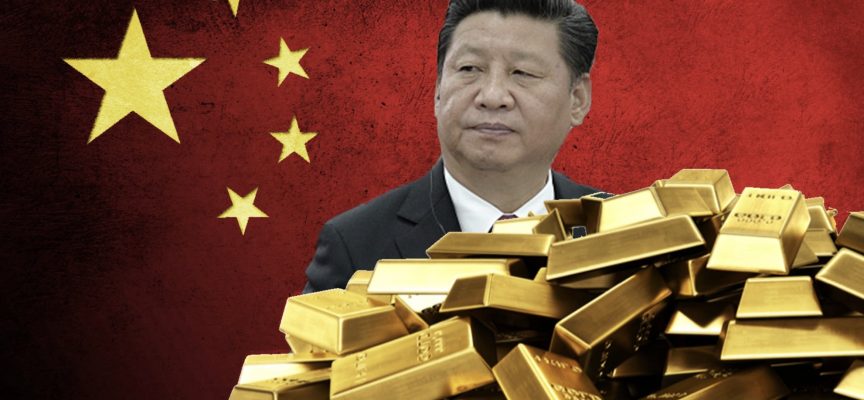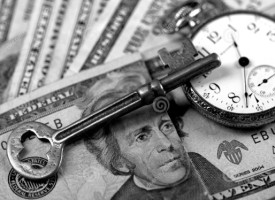As we kickoff trading in the final week of May, one of the top money managers in the world said China is going to unleash the gold price along with a new monetary system.
China Will Send Gold Soaring
May 25 (King World News) – Dr. Stephen Leeb: Investors who have long had a particular interest in gold are surely asking themselves: How does the pandemic that originated in China and swept through the world impact the outlook for the metal?
My assessment? It will only speed up what already was inevitable, i.e., China’s forward march in ways that will send gold soaring.
The pandemic will make it easier for China to broaden its already sizable lead over the West in all those characteristics that position an economy to define what a monetary reserve system should look like. And China, as I’ve been arguing, will use that edge to create a new monetary system that will likely be a basket of currencies but that certainly will be backed by gold.
$20,000 Gold
I’m still guessing that ultimately this will lift gold to $20,000 or so. But one lesson everyone should take away from this pandemic is humility. The world throws a lot of curve balls, and the world could change in any number of unforeseen ways. Still, the more unexpected changes, the more likely that gold will be the one investment that’s utterly essential to own.
One mystery as the pandemic has progressed has been why there has been such a dramatic difference in how it has impacted East and West. Whether from Kismet or some unknown malice, the West has been hammered while the East has been relatively unscathed. The U.S. no doubt could have handled the virus better. But any shortcomings in our response don’t seem nearly commensurate with the massive difference between East and West. And note it’s not just the U.S. that has been far harder hit than the East; so, has the entire West, spanning Eastern Europe to California…
Billionaire Eric Sprott Buying
To find out which company billionaire Eric Sprott just bought a 12% stake in click here.
A plausible possibility is that there were two strains of the virus. At last count, the developed democracies in the East – Australia, South Korea, Japan, etc. – had suffered about 1,700 deaths out of about 260 million people. The New York City metropolitan area, the epicenter in the U.S., which is where I live, has seen 26,000 deaths in a population of 19 million. And in Germany, a positive outlier in the West had nearly 5 times the number of deaths in the Easter democracies with less than 1/3rd the population. These differentials beg for thorough exploration, though it’s possible we never will know for sure what accounts for it.
The East’s easier time with the virus, whatever the explanation, has left it in better shape going forward. That is good reason to believe that economic growth is going to resume in the U.S., and likely strongly, because it’s the only shot we have to hold our own against China. History shows that growth even in the midst of a devastating virus is possible. In 1918 the Spanish flu, the worst pandemic in recent history, resulted in 675,000 U.S. deaths. Yet while that was happening, the economy grew at a 9% pace, thanks in large part to the war effort.
Growing Hostility Towards China Over Pandemic
One very disturbing upshot of the pandemic is the growing hostility here towards China, which is becoming more evident daily. Focusing on China as our enemy, painting it as an existential threat to the U.S. will foster unity in the U.S. It could lead to a war-like effort to grow our economy – but at a horrid cost that would likely be self-defeating and which could abort all the ways in which the two countries could find areas of cooperation that could make the world a better, safer place. I don’t believe that China, with all its faults, is aiming for global hegemony. Working with China wherever possible seems a much better option than taking positions that ensure that China does indeed become our implacable foe.
For anyone who says, yes, but what about China’s human rights record, what about its treatment of Muslims, what about whatever, I won’t argue. There’s plenty to deplore. But that still shouldn’t make it impossible to find some common ground. Just consider that one of our strongest allies in the past half century has been Saudi Arabia, hardly a bastion of democracy, humanism, and freedom. Yet we seem to have no problem overlooking its flaws. You could say the same about a lot of other countries we work with.
Let’s look more closely at where the countries are vis-à-vis recovery from the pandemic. The U.S. has been spending unheard-of amounts of money essentially just to keep the economy afloat, to ensure that food and shelter remain available and that the economy’s basic infrastructure remains intact. China, with the pandemic under control, has announced 2020 infrastructure expenditures of over half a trillion dollars which is part of a $2.5 trillion-dollar six-year budget. A large chunk of this infrastructure will be dedicated to new technology, not bridges to nowhere – to the digital economy and to new energies – everything from EV charging stations to 5G to AI. At the same time, the government is allocating massive sums to further reducing, and in fact eliminating, absolute poverty anywhere in China.
It is sad to hear the U.S. bluster, somewhat desperately, about whether Taiwan Semiconductor, which has several factories in mainland China, will be allowed to manufacture chips for Huawei. Consider that Telus, a major Canadian telecom, brags in its investor material that it has an edge in 5G thanks to its use of Huawei chips. Huawei, it seems, isn’t losing much if any ground despite U.S. sanctions.
A New Monetary System
China continues to take steps toward the development of a new monetary system. The country is testing the first sovereign digital coin, which will completely replace paper money. As a digital currency, the amount in circulation will be easy to monitor. I expect the coin to be implicitly or explicitly backed by gold. It will use a variation of blockchain to manage it and will facilitate trade with other countries. Very pertinent is that China’s gold trading is settled in physical gold, in contrast to the U.S. and London gold markets, where contracts are almost always rolled over, meaning settlement is rarely in gold. Loosely speaking our gold markets are largely for speculators while China’s are for investors. The point is that the Chinese along with some foreigners already have a ready way of exchanging yuan for gold – making it reasonable to see the yuan as already implicitly backed by gold. With the digital coin, that backing will be closer to being explicit.
What I have said so far is based on reliable news sources ranging from the Asia Times to Bloomberg to the Wall Street Journal. I would speculate that what’s true as well is that as a result of the pandemic, the Saudis are now accepting yuan in exchange for oil. Even Bloomberg carried an opinion piece noting that low oil prices would give the Chinese the leverage to pay for Saudi oil in yuan. This is a natural and critical step that I expected would follow the successful launch of the futures contract in Eastern oil. That contract has proved useful as establishing the price for Eastern oil, though in common with other oil exchanges the purpose is more price discovery than the actual exchange of yuan for oil.
Unlike past versions of a gold standard in which gold’s value was fixed, the new system will be designed to readily allow for growth and to allocate scarcities. Growth and scarcities are natural bedfellows in a world in which two trends will accelerate: faster-paced growth by the entire emerging world along with a transition to renewable resources. The yellow metal, which by and large Westerners ignore, in time will be valued many times higher than today as it comes to back up much of international trade as well as internal currencies.
The unanswered question is whether the U.S. will participate. The pandemic is accentuating U.S. desperation about China. While we’ve been No. 1 for a long time, I think we’d be well served not to insist on retaining that status – an insistence likely to backfire – but rather to understand that sharing hegemony with China in a multipolar world isn’t such a bad thing for us. Indeed, it could offer us an opportunity to fix many of the failings that have left us a laggard. China has emphasized it is willing to work cooperatively with us, and to reflexively reject that possibility would be woefully, and possibly tragically, misguided.
But whatever approach we end up following, and for all the uncertainties that should keep us all humble, the one thing that I would bet on – under any conceivable scenario – is that gold will be having a long-term star turn. Read the top breaking news in the world at KingWorldNews.com
***To listen to Bill Fleckenstein’s timely KWN audio interview on the gold market and much more click here or on the image below.
Silver, Gold, Crude Oil, Plus The Week Ahead
***Also Released: Greyerz – Jim Sinclair’s $87,000 Gold And China’s 20,000 Tonnes Of Gold CLICK HERE.
© 2020 by King World News®. All Rights Reserved. This material may not be published, broadcast, rewritten, or redistributed. However, linking directly to the articles is permitted and encouraged.








